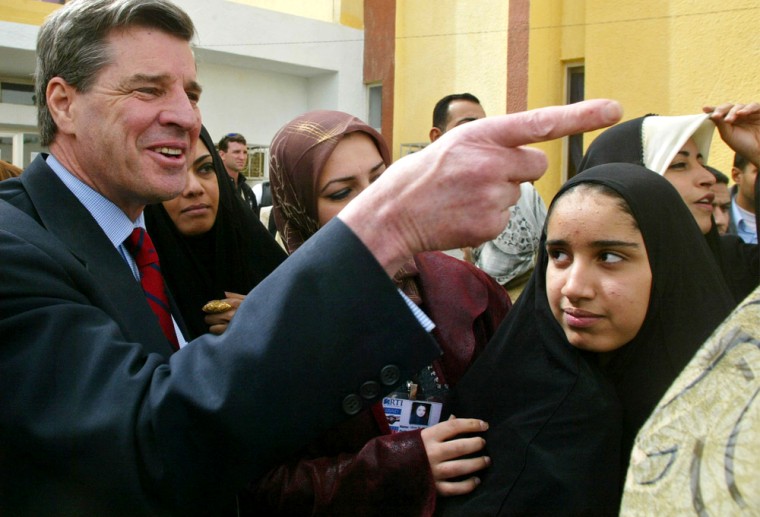The top U.S. administrator in Iraq suggested on Monday that he would block any interim constitution that would make Islam the chief source of law, as some members of the Iraqi Governing Council have sought.
L. Paul Bremer said the current draft of the constitution would make Islam the state religion of Iraq and “a source of inspiration for the law” — as opposed to the main source.
Many Iraqi women have expressed fears that the rights they hold under Iraq’s longtime secular system would be rolled back in the interim constitution being written by U.S.-picked Iraqi leaders and their advisers, many of them Americans. U.S. lawmakers have urged the White House to prevent Islamic restrictions on Iraqi women.
Asked what would happen if Iraqi leaders wanted to write into the constitution that Islamic sharia law is the principal basis of the law, Bremer suggested he would wield his veto. “Our position is clear. It can’t be law until I sign it.”
Bremer must sign into law all measures passed by the 25-member council, including the interim constitution. Iraq’s powerful Shiite clergy, however, has demanded the document be approved by an elected legislature. Under U.S. plans, a permanent constitution would not be drawn up and voted on until 2005.
Bremer used the inauguration ceremony at a women’s center in the southern city of Karbala to argue for more than “token” women’s representation in the transitional government due to take power on June 30.
“I think it is very important that women be represented in all the political bodies,” Bremer said.
“Women are the majority in this country, in this area probably a substantial majority,” he said, referring to the Saddam Hussein’s 1991 purges of Shiite Muslim men. Those killings left the holy city of Karbala and other Shiite cities dotted with mass graves and brimming with thousands of widows.
Less say after June 30
Bremer also acknowledged that U.S. influence on an Iraqi constitution would fade substantially after the June 30 handover. U.S. observers have predicted liberal reforms enshrined in the transitional law could well be rolled back in a future constitution.
“There will be a sovereign government here in June. The Iraqis then will then have responsibility for their own country,” Bremer said. “There’s a real hunger for democracy in this country. It may not look like American democracy, but there’s a real hunger for it and we’re encouraging that.”
There are three women on the Governing Council.
Mohsen Abdel-Hamid, the current council president and a member of a committee drafting the interim constitution, has proposed making Islamic sharia law the “principal basis” of legislation.
The phrasing could have broad effects on secular Iraq. In particular, it would likely moot much of Iraq’s 1959 Law of Personal Status, which grants uniform rights to husband and wife to divorce and inheritance, and governs related issues like child support.
Under most interpretations of Islamic law, women’s rights to seek divorce are strictly limited and they only receive half the inheritance of men. Islamic law also allows for polygamy and often permits marriage of girls at a younger age than secular law.
In December, the council passed a decision abolishing the 1959 law and allowing each of the main religious groups to apply its own tradition — including Islamic law. Many Iraqi women expressed alarm at the decision, and Bremer has not signed it into law.
Earlier this month, 45 members of the U.S. House of Representatives signed a letter to President Bush urging him to act now to preserve women’s rights.
“It would be a tragedy beyond words if Iraqi women lost the rights they had under Saddam Hussein, especially when the purpose of our mission in Iraq was to make life better for the Iraqi people,” the letter read.
